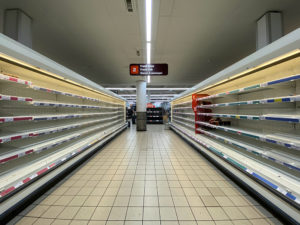How We Eat: Meat Shortages May Reshape Diets
 Photo by John Cameron on Unsplash
Photo by John Cameron on Unsplash COVID-19 seems to be changing how we eat. As anyone who’s gone shopping in the last few weeks can tell you, meat is becoming a rarity. Fast food chain Wendy’s has limited menus to chicken-only items at some locations. Costco is capping purchases of fresh beef, pork, and poultry to three per shopper. Kroger Co. placed similar restrictions at certain stores, and Tyson and others are shutting down meat plants and slowing production. Despite these changes, President Trump tried to keep the burgers coming by signing an executive order labeling meat plants “critical infrastructure.” We can assume the workers at these meat plants weren’t consulted—a group that so far has seen twenty deaths from COVID-19 and an estimated 6,500 sick or exposed to COVID-19 while working near someone who tested positive. In short, the meat industry is beginning to shake.
But what does this mean for the consumer? Unfortunately, for vegetarians and vegans, veggie burgers might be hard to find. As meat supplies continue to drop—and the hoarders become more anxious—people are looking to alternatives for their beef, poultry, and pork. Meat substitutes like Beyond Burgers are surging in grocery sales, mitigating losses by restaurant closings. In contrast, meat and dairy farms are euthanizing cattle and dumping upwards of 3.7 million gallons of milk every day due to a loss in demand from restaurants closing.
The decline in meat consumption, while not voluntary, presents a unique opportunity for plant-based alternatives and a potential detachment from our heavy reliance on factory farms. Whether you’re a “ride or die” for bacon and cheese or open to alternatives, many can agree that our animal industry is an unmitigated mess, specifically factory farms, or “concentrated animal feeding operations” (CAFOs). These operations are detrimental to water quality and public health in rural America.
The contributing factor to CAFO pollution is how fecal waste is managed. Feeding operations in the United States produce 335 million tons of manure annually. This waste is stored in open-air lagoons. When these lagoons are full, farmers spray the waste to the surrounding areas, contaminating water supplies in neighboring communities. These lagoons are also prone to overflow in heavy rains. Worse still are natural disasters such as 2018’s Hurricane Florence, which overflowed hundreds of manure lagoons and jeopardized water quality in neighboring communities in North Carolina. Furthermore, between watering crops for feed and providing drinking water to the animals, producing just one pound of beef takes an estimated 1,581 gallons of water.
Factoring in the methane produced by animals at these facilities, it’s clear that factory farms are a major threat to our environment. But the challenges don’t stop there. CAFOs disproportionately damage the public health of low-income communities. These communities are almost exclusively communities of color—a focal point in environmental justice. And the issues aren’t isolated to smell and water supply; studies routinely show increased health risks related to proximity. A study on North Carolina CAFOs found 252,070 homes (predominantly African American, Hispanic, and Native American) within a three-mile radius of an open-air lagoon. People living in those homes faced a higher risk of anemia, kidney disease, and bacterial blood infection and a shorter life expectancy. Children attending schools similarly close to these open lagoons are prone to higher rates of asthma-related symptoms, asthma diagnoses, and asthma-related doctor visits.
Not only is human health jeopardized, but as concentrated animal feeding operations expand across the nation, small-scale farmers are displaced, which jeopardizes diversity in our food chain. CAFOs often aren’t properly regulated or tracked either. In 2007 environmental groups shed light on this lack of oversight in Iowa, resulting in the use of satellites to determine the number of CAFOs within its border. They found 5,000 more CAFOs beyond what the state previously knew about.
Simply put, our meat industry is a mess. A large societal shift towards plant-based diets would both improve the health of our environment and protect the communities surrounding CAFOs. Now is the time, when meat is expensive and hard to come by, to try a veggie burger. Indulge in meat alternatives. You may end up liking them or, at the very least, feel a lot better skipping the bacon or steak.
This is not to say meat is evil, but our reliance and obsession on it has bred large farming operations detrimental to people and the environment. Even if you find meat alternatives distasteful, try shopping locally at small farms for your meat. Having an ample supply of small to medium sized farms would help prevent the shortage we’re having by diversifying our food chain—and our food sources.
COVID-19 is reshaping our society in so many ways. Just this past weekend, I was involved in a car conga line as a family celebrated a graduation. With all these changes, now is a great time to reflect on our eating habits and take this meat shortage as an opportunity to try something new and end our reliance on CAFOs and factory-farmed meat.
